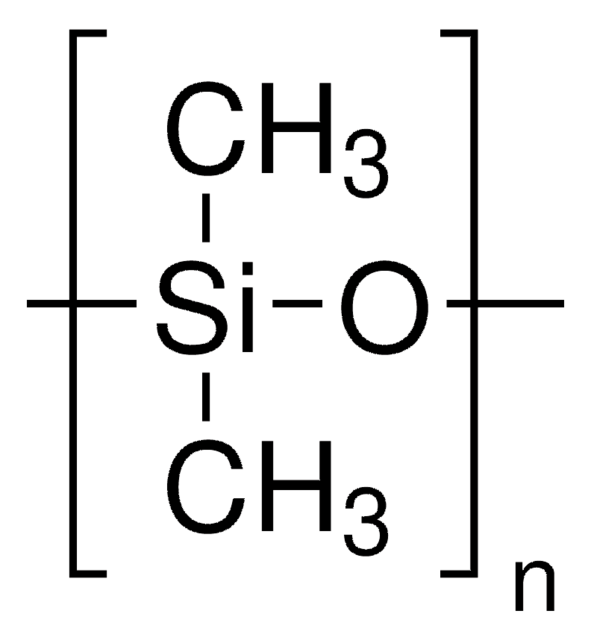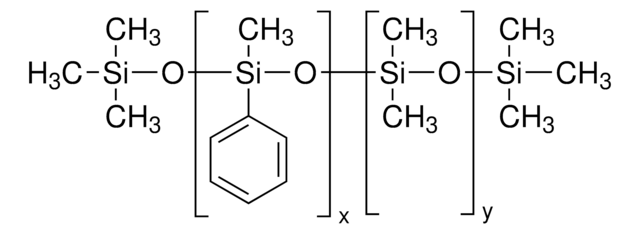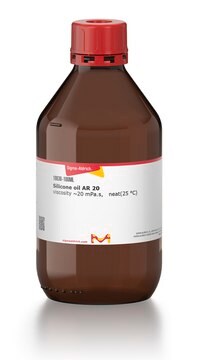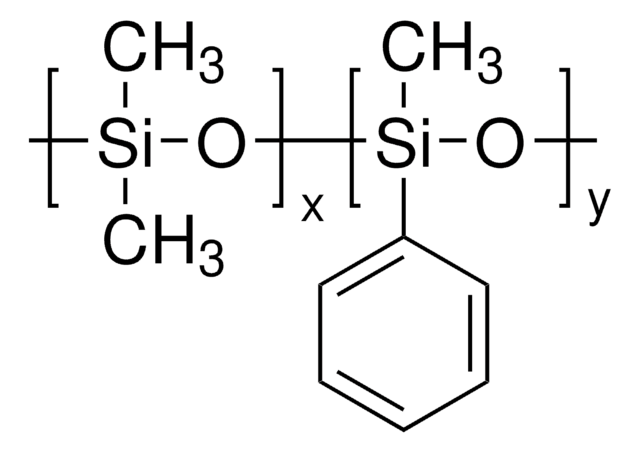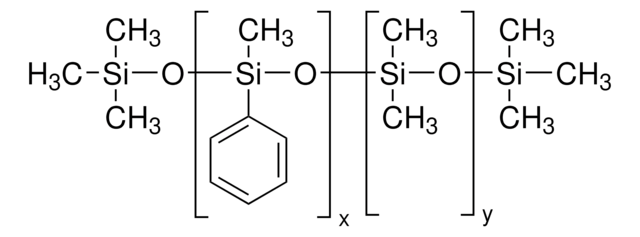50384
Silicone oil AP 150
viscosity ~150 mPa.s, neat(25 °C)
Synonyme(s) :
Silicone fluid
Se connecterpour consulter vos tarifs contractuels et ceux de votre entreprise/organisme
About This Item
Produits recommandés
Description générale
Silicone oil AP 150 is a conventional electrorheologic (ER) fluid. It was employed as an insulating medium during the poling of hard ferroelectric ceramics. Silicon oil is composed of a mixture of hydrophobic polymeric and monomeric compounds, containing silicon-oxygen bonds. Its physical and chemical characteristics have been reported. The utility of silicon oil as a vitreous substitute has been studied.
Application
Silicone oil AP 150 was used to prevent the water evaporation during rheological characterization of injectable polysaccharide system based on calcium alginate hydrogel and two dextran methacrylate derivatives. It may be used for the determination of chloroplast volume by the silicone oil filtering centrifugation technique.
Code de la classe de stockage
10 - Combustible liquids
Classe de danger pour l'eau (WGK)
WGK 3
Point d'éclair (°F)
437.0 °F - closed cup
Point d'éclair (°C)
225.00 °C - closed cup
Équipement de protection individuelle
Eyeshields, Gloves
Faites votre choix parmi les versions les plus récentes :
Déjà en possession de ce produit ?
Retrouvez la documentation relative aux produits que vous avez récemment achetés dans la Bibliothèque de documents.
Les clients ont également consulté
Silicone Oil: Different Physical Proprieties and Clinical Applications.
Barca F, et al.
BioMed Research International, 2014 (2014)
Poling of hard ferroelectric PZT ceramics.
Kamel TMand de With G.
J. Eur. Ceram. Soc., 28(9), 1827-1838 (2008)
L Pescosolido et al.
European biophysics journal : EBJ, 39(6), 903-909 (2009-03-28)
A novel injectable polysaccharide system based on calcium Alginate (Ca-Alg) hydrogel and two Dextran methacrylate derivatives (DexMA) was recently developed. The resulting Interpenetrating Polymer Network showed a synergistic mechanical behavior that can be exploited to target the hydrogel properties towards
F Aliotta et al.
Physical review. E, Statistical, nonlinear, and soft matter physics, 87(6), 062304-062304 (2013-07-16)
The influence of interactions between particle surface and host fluids in electrorheological suspensions is explored. It is observed that dispersions of nanosized particles of titania in octanoid acid exhibit an anomalously large electrorheologic effect when compared with a similar dispersion
S P Robinson
Plant physiology, 79(4), 996-1002 (1985-12-01)
Spinach leaf chloroplasts isolated in isotonic media (330 millimolar sorbitol, -1.0 megapascals osmotic potential) had optimum rates of photosynthesis when assayed at -1.0 megapascals. When chloroplasts were isolated in hypertonic media (720 millimolar sorbitol, -2.0 megapascals osmotic potential) the optimum
Notre équipe de scientifiques dispose d'une expérience dans tous les secteurs de la recherche, notamment en sciences de la vie, science des matériaux, synthèse chimique, chromatographie, analyse et dans de nombreux autres domaines..
Contacter notre Service technique